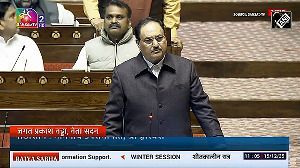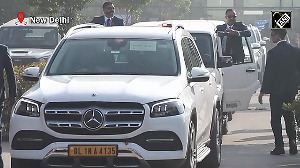 The government could afford to bask in the afterglow of the Union Budget, which has been received warmly in nearly every quarter and received a 343-point salute by the Sensex on the first day of stock trading since the finance minister spoke in Parliament.
The government could afford to bask in the afterglow of the Union Budget, which has been received warmly in nearly every quarter and received a 343-point salute by the Sensex on the first day of stock trading since the finance minister spoke in Parliament.
Instead, the top bureaucracy appears to be aware that it has a packed agenda in the months to come. Revenue Secretary Sunil Mitra gave A K Bhattacharya a glimpse of the winding road ahead. Edited excerpts:
What are the key objectives of your taxation proposals in the Budget?The key objectives on the revenue front were basically to convey a signal that the Budget marks a move towards the two major tax reform issues that we are committed to, that is, the Direct Taxes Code and the goods and services tax. By partially rolling back the stimulus that was provided through fiscal incentives in the excise duties and by retaining the service tax at 10 per cent, we are primarily signalling that we are going back to a unified goods and services tax. Similarly, widening the tax slabs was a signal that we are moving closer to the objectives outlined in the direct taxes code.
What were the underlying assumptions behind your revenue numbers?
We have factored in the growth for the next year. Taking into considerations the GDP growth on a higher trajectory and the concomitant tax buoyancy, we have projected 11 per cent growth in direct taxes to Rs 4,30,000 crore (Rs 4.3 trillion) and on indirect taxes which include service tax, we have projected 28.8 per cent growth at Rs 3,15,000 crore (Rs 3.15 trillion).
In the overall, the growth factor is 18 per cent and we are trying to step back towards the fiscal discipline route with a tax-to-GDP ratio of 10.8 per cent.
By giving away tax concessions this year, have you made your task for the next year more difficult, when you would have to phase out many of the exemptions as envisaged in the direct taxes code?
Exemptions will have to be narrowed down and will have to be rationalised. The exemptions are largely in the area of excise duty or Customs. So, if there is going to be an alignment through GST on one rate, which is applicable across the country, we will have to moderate and rationalise exemptions. This year, we have reduced some exemptions, which are peripheral. We were able to do very little. When we have a larger mandate, then of course things will be faster.
What is going to be the likely central GST rate?
How can I say what that rate would be. You know that the 13th Finance Commission has suggested 12 per cent.
Is that rate feasible now?
I do not think so. Honestly, it has to be somewhat higher. But how much higher will really depend on our discussion with the states. My understanding is that the areas of divergence have shrunk. We have convergence on a wide range of issues. It may not be very difficult to cross the last mile and be able to reach a consensus. But whatever that may be, we have to agree with the states.
You are reasonably confident that April 2011 is a feasible date for introducing both the direct taxes code and GST.
On DTC, I can tell you what we intend to do now. Our consultations so far have been quite adequate. We have a large number of opinions from all stakeholders. We are consolidating all of this with the objective of bringing out a revised version of the direct taxes code.
There are demands from across industries. We intend to bring out a revised paper and go through a consultation process with industry, so that we can factor in their views. The finance minister has expressed his intention that by the monsoon session this year we should be able to take the legislative process forward.
If that happens and the committee goes into the examination of the legislative proposals, then it should really be done by the end of the calendar year, which allows us enough time in the next year. So, perhaps, in the winter session itself we can take this forward. DTC is simpler. For GST, as much as we would like it to happen early, we have to depend on the views of the states.
Are your service tax numbers an underestimation, since you have expanded its coverage in a big way?
Services constitute almost 60 per cent of GDP. But service tax constitutes only 1 per cent of our tax collections. So, I think there is a lot of scope to collect more revenue under the service tax net, even at the existing rate of 10 per cent. And that really will be our endeavour.
Are you then saying there is an upside to the service tax collections you have given in the Budget?
Absolutely.
On the excise front, you have said Rs 26,000 crore is the additional collection because of the rise in the excise on petrol and diesel. If we take that out of your total tax collections, the growth rate is only 4 per cent. Have you underestimated excise collections as well?
There has not been much of an excise revenue growth. If you look at the entire schedules, you will see that we have not grown much except in petrol and diesel. There has also been many giveaways. There are several exemptions on project imports. That is why the excise growth without petrol and diesel has been very negligible.
You have raised the minimum alternate tax (MAT) rate from 15 to 18 per cent. This is very close to the average effective rate of corporation tax of 22 per cent. Do you see further scope for raising MAT?
At the moment, we are not raising it beyond 18 per cent. The objective of raising MAT is to bring in greater equity. Although the corporation tax rate is now 33 per cent, the effective rate is 22 per cent across the board. Software firms actually pay only about 11 per cent. So, there is a need to rationalise it. In our entire taxation effort, we have given away something and balanced that by levying some taxes. Here, the proposals on MAT and surcharge are practically revenue neutral. What we have levied through MAT has been given away through the reduction in surcharge.
How are you going to absorb the impact of the 13th Finance Commission recommendation on reviewing the various types of central cess and surcharges with the states?
The surcharge that we levy is not being transferred to the states. We are doing away with the surcharges. The cess as of now is non-divisible. Whether this will be reviewed or not, I am not aware. This is not an issue that we discussed in the last one month.
Your tax arrears, not in dispute, have been rising. Isn't that a matter of concern?
We are conscious of this. We have our colleagues in Mumbai to hold a meeting on this. We have raised this as a matter of concern with the chief commissioners of income-tax. This is certainly a matter that is worrying us. And, you know, as far as the disputed tax arrears are concerned, they have also increased. But to tackle that, we have expanded the scope of the Settlement Commission. That is one of the ways. But for tax arrears not in dispute, we have to push ourselves and regularly monitor them and ensure that they are collected.
How will the Kirit Parikh Committee's recommendations for oil sector pricing impact you?
The Kirit Parikh Committee report is something that the petroleum ministry must decide. Let it take the proposal to the Cabinet.






